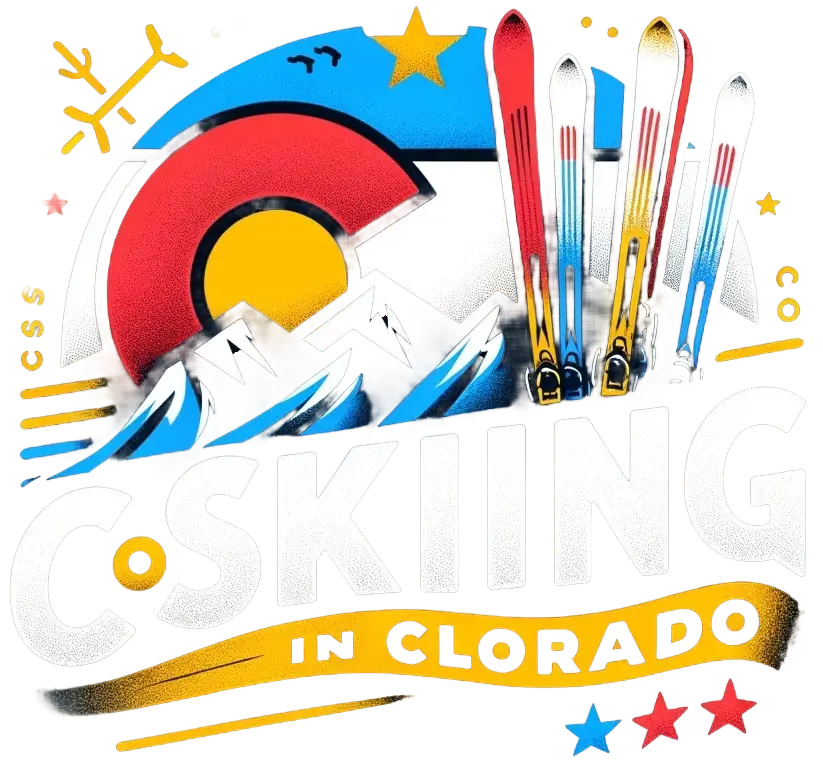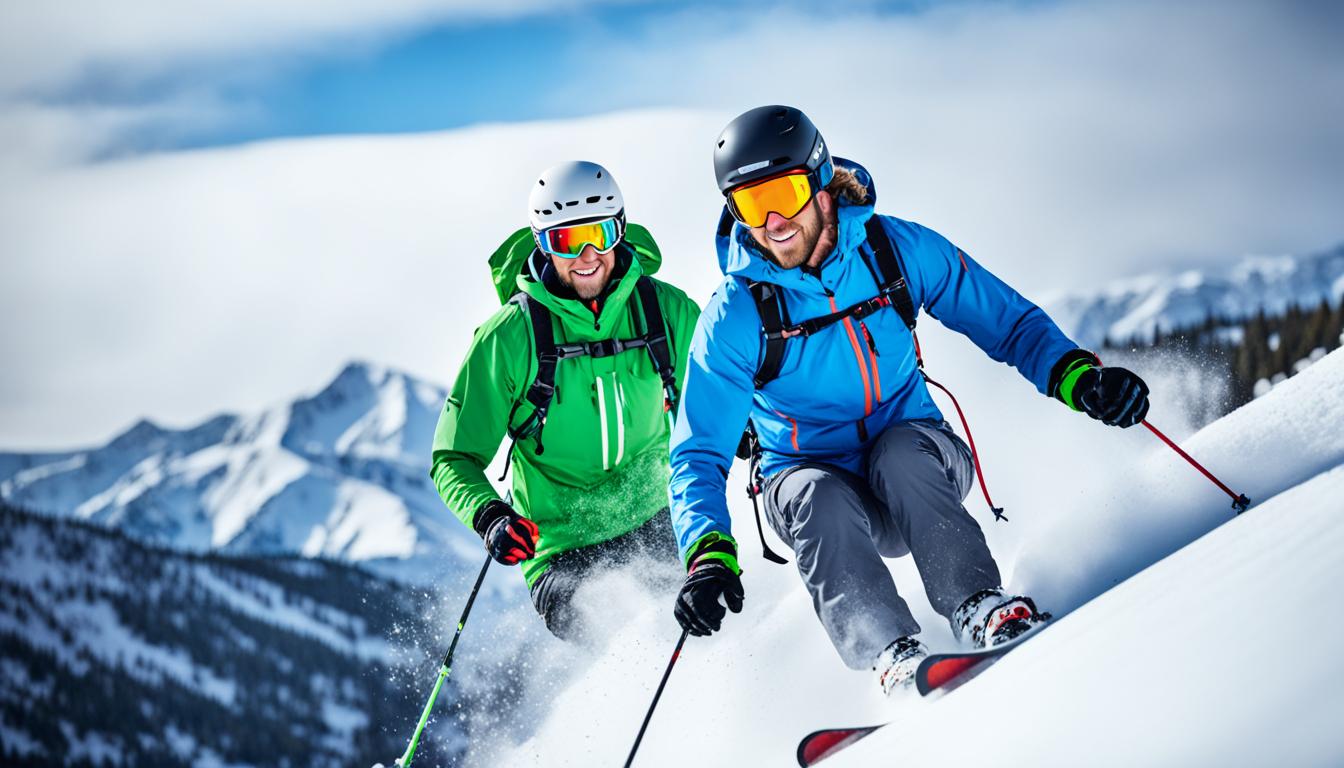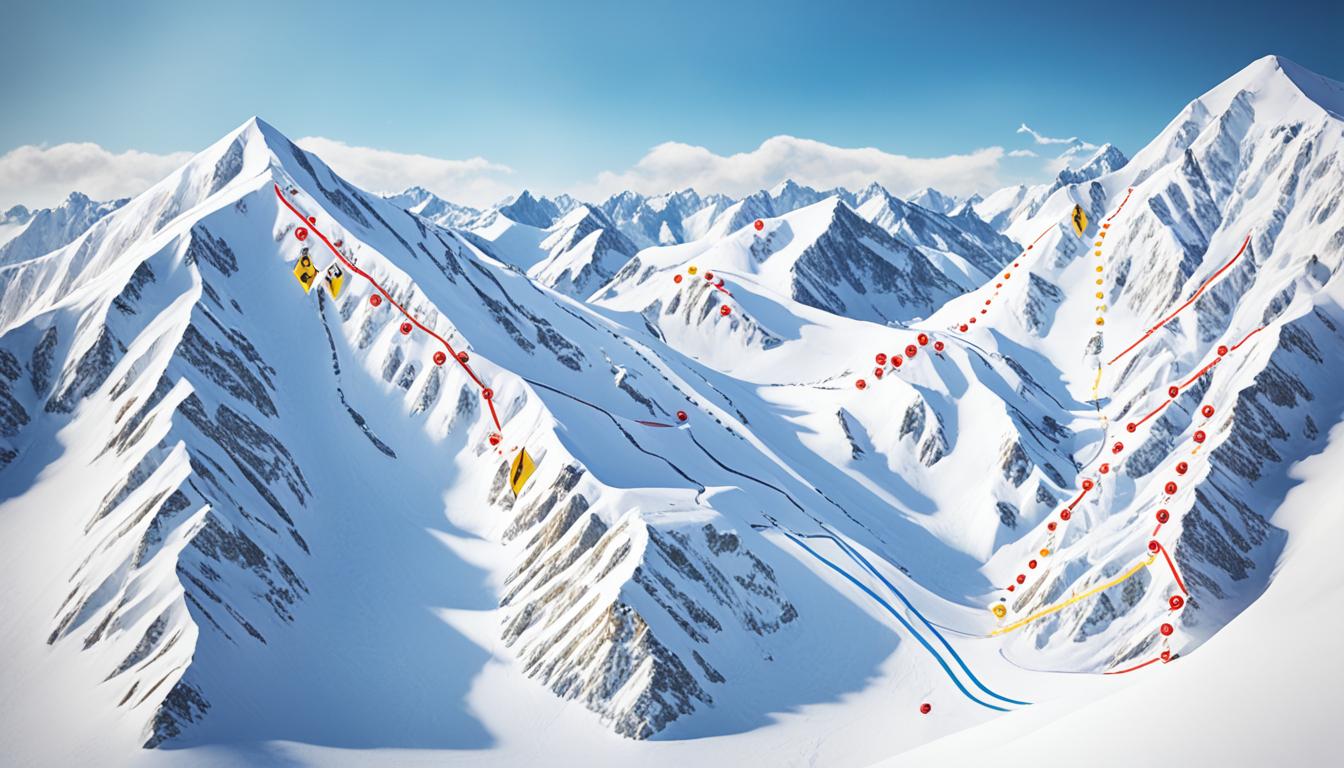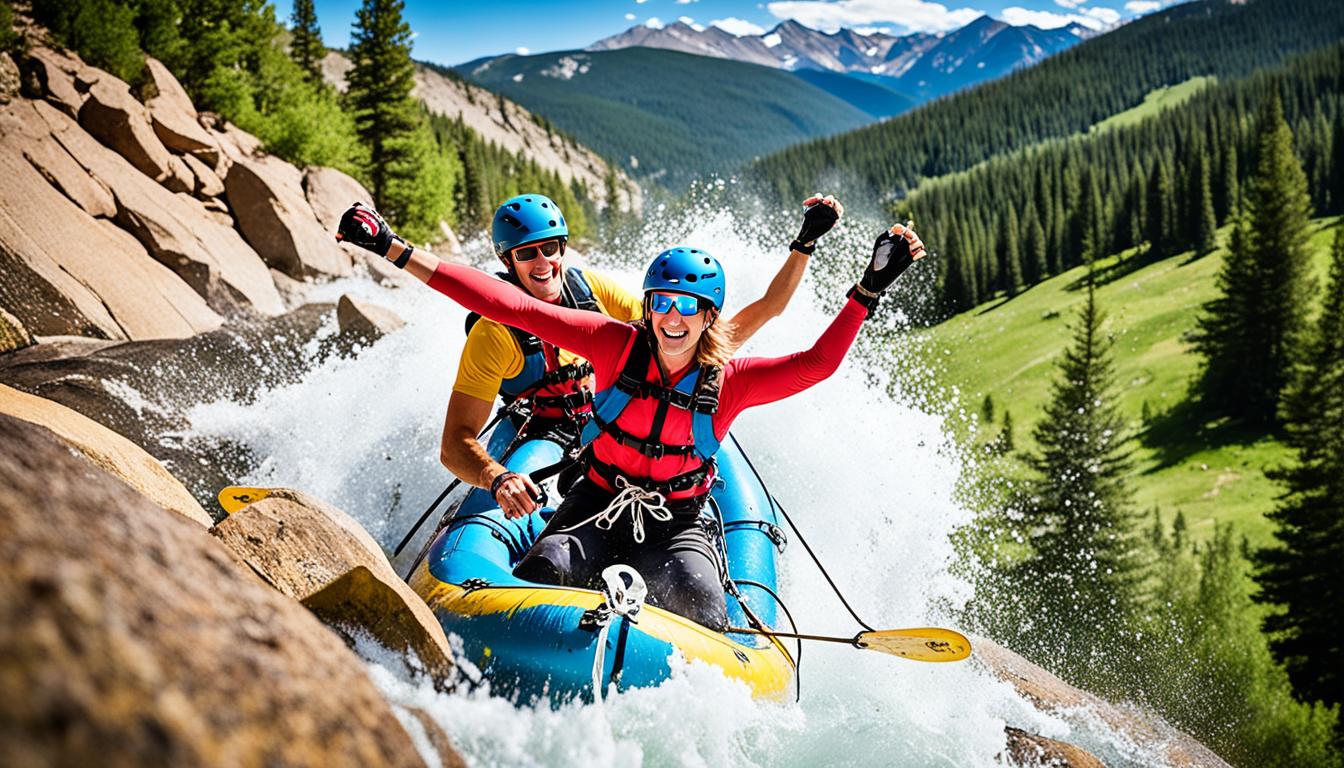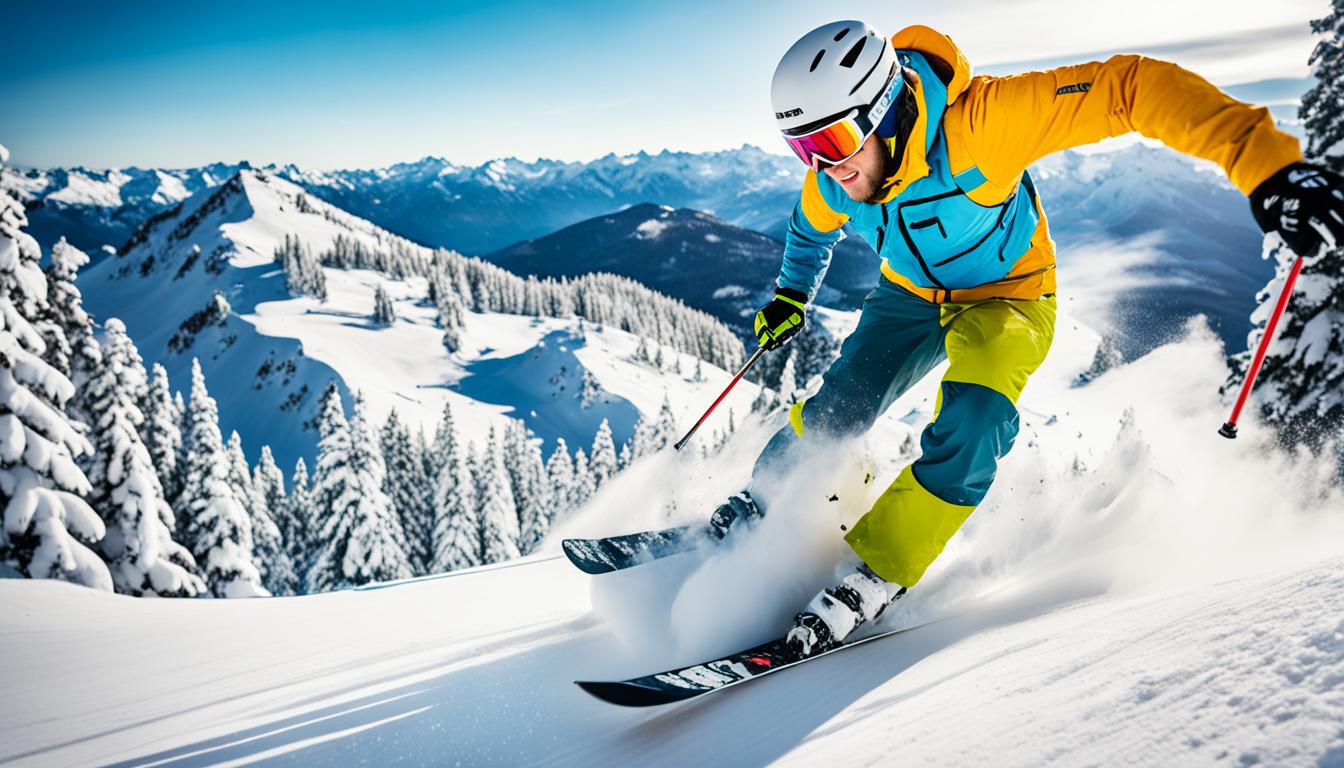Are you ready for an unforgettable holiday skiing adventure in Colorado? Look no further! With its stunning mountain ranges, world-class ski resorts, and exciting winter activities, Colorado is the ultimate destination for ski enthusiasts. Whether you’re a seasoned skier or a beginner, there’s something for everyone in this winter wonderland.
Colorado boasts 26 incredible ski resorts spread across 15 diverse and picturesque mountain ranges. From the renowned Vail Ski Resort to the hidden gem of Crested Butte Mountain Resort, you’ll find a wide range of terrains and amenities to suit your skiing preferences. Not to mention, the breathtaking views of the Rocky Mountains will take your breath away.
Planning a ski trip in Colorado is an exciting process. From choosing the right ski resort to preparing your gear and body, every step contributes to a memorable experience. Our comprehensive guide will provide you with essential tips and insights to ensure your holiday skiing adventure in Colorado is nothing short of amazing.
Key Takeaways:
- Choose from 26 amazing ski resorts in Colorado, offering a variety of terrains and amenities.
- Plan your ski trip in advance to ensure a smooth and enjoyable experience.
- Gather the essential gear, including a properly fitted helmet, goggles, and layers of synthetic fabrics for warmth and comfort.
- Inspect and maintain your ski gear before hitting the slopes for optimal performance.
- Prepare your body through preseason conditioning to enhance your skiing abilities and prevent injuries.
Choosing the Right Ski Resort in Colorado
When planning a ski trip to Colorado, it’s important to choose the right ski resort based on your preferences and travel distance. Whether you’re a beginner seeking gentle slopes or an expert looking for challenging terrain, Colorado offers a wide range of ski resorts to suit every skier’s needs.
For those flying into Denver, there are several ski resorts near the city that provide convenient access. Winter Park Resort, located just 67 miles from Denver, offers over 3,000 acres of skiable terrain and a variety of winter activities for the whole family. Copper Mountain, about 75 miles west of Denver, boasts over 2,400 acres of skiable terrain and a lively village atmosphere. Vail Ski Resort, a bit further west, offers world-class skiing along with luxurious accommodations and upscale dining options.
If you’re looking for a more secluded skiing experience away from the crowds, consider heading to ski resorts that are 3+ hours away from Denver. Steamboat Ski Resort, located about 160 miles northwest of Denver, is known for its Champagne Powder® and offers a wide range of terrain for all skill levels. Aspen Snowmass, approximately 200 miles southwest of Denver, is famous for its four mountains, each offering unique skiing experiences. Crested Butte Mountain Resort, situated about 230 miles southwest of Denver, is a hidden gem known for its challenging slopes and picturesque mountain views.
If you’re willing to venture further afield, Southwest Colorado is home to some of the state’s best ski resorts. Telluride Ski Resort, nestled among the San Juan Mountains, offers breathtaking scenery and fantastic powder. With over 2,000 skiable acres, Telluride is a favorite among advanced skiers and snowboarders.
When considering which ski resort to choose, take into account the distance, amenities, terrain, and the overall experience you’re seeking. Whether you prioritize convenience, seclusion, or breathtaking mountain landscapes, Colorado’s ski resorts have something to offer every winter sports enthusiast.
| Ski Resort | Distance from Denver | Terrain | Amenities |
|---|---|---|---|
| Winter Park Resort | 67 miles | Gentle slopes to advanced terrain | Lodging, dining, and winter activities |
| Copper Mountain | 75 miles | Wide variety of terrain | Lively village atmosphere |
| Vail Ski Resort | 100 miles | World-class skiing | Luxury accommodations and dining |
| Steamboat Ski Resort | 160 miles | Varied terrain for all skill levels | Hot springs and family-friendly activities |
| Aspen Snowmass | 200 miles | Four mountains with diverse terrain | Upscale shopping and dining |
| Crested Butte Mountain Resort | 230 miles | Challenging slopes and scenic beauty | Quaint town with a vibrant arts scene |
| Telluride Ski Resort | 330 miles | Breathtaking terrain and stunning views | Exclusive mountain village and high-end amenities |
Preparing for Skiing in Colorado
To fully enjoy your holiday skiing in Colorado, it’s important to gather the essential gear needed for the slopes. Here are some ski gear essentials you should consider:
Helmets
A properly fitted helmet is crucial for your safety on the slopes. Protect your head from potential injuries by investing in a high-quality helmet.
Neck Gaiter
A neck gaiter provides added warmth and protection against cold mountain air. It also helps prevent snow from entering your clothing.
Goggles
Goggles are essential for protecting your eyes from wind, snow, and the sun’s harmful UV rays. Choose goggles with anti-fog technology for clear visibility.
Sunscreen
Don’t forget to apply sunscreen to protect your skin from the strong sun at high altitudes. Opt for a high SPF sunscreen that is specifically designed for winter sports.
Water Bottle
Staying hydrated is crucial while skiing. Carry a water bottle or hydration pack to ensure you have easy access to water throughout the day.
Layers and Synthetic Fabrics
Dress in layers with synthetic fabrics to regulate your body temperature and keep you dry. Avoid cotton as it absorbs moisture and can leave you feeling cold.
Gloves
Invest in waterproof gloves to keep your hands warm and dry. Consider gloves with insulation for added warmth in colder conditions.
Hand Warmers
Hand warmers can provide extra warmth on particularly chilly days. Simply activate them before heading out on the slopes and slip them into your gloves.
Ski Pass
If you plan on skiing multiple times during the season, it’s worth investing in a ski pass. Ski passes offer convenience and savings for frequent skiers.
By gathering these ski gear essentials, you’ll be prepared for a comfortable and enjoyable skiing experience in Colorado.
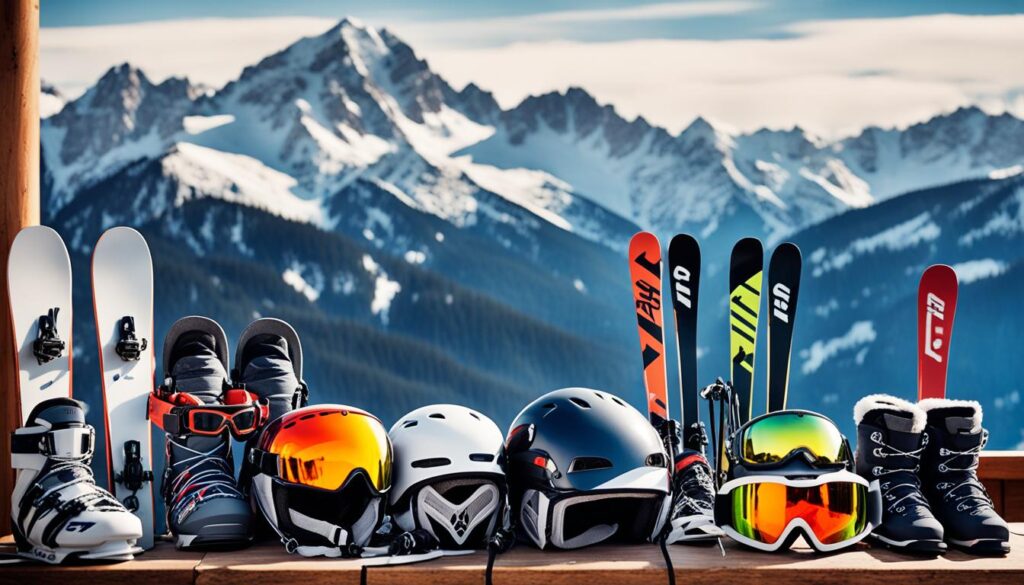
Inspecting and Maintaining Your Gear
Before hitting the slopes, it’s crucial to inspect your ski gear and ensure it’s in top condition. Properly maintained gear not only enhances your skiing experience but also contributes to your safety on the mountain. Follow these steps to inspect and maintain your ski gear:
1. Snow Pants, Jackets, and Gloves
Inspect your snow pants, jackets, and gloves for any signs of wear and tear. Check for holes, tears, or damaged zippers that may compromise their functionality. If you spot any issues, consider repairing them or investing in new gear for optimal protection against the elements.
2. Bindings
Secure bindings are essential for your safety while skiing. Ensure that the bindings are properly adjusted and fastened tightly to your ski boots. If you’re unsure how to check the bindings, seek assistance from a professional or visit a local ski shop for a binding inspection.
3. Goggles
Your goggles play a crucial role in protecting your eyes from snow, wind, and harmful UV rays. Before hitting the slopes, inspect your goggles for any scratches, cracks, or fogging issues that may hinder your visibility. If necessary, replace them to ensure clear vision during your ski adventure.
4. Tuning Skis or Board
Regular ski or board tuning is essential for optimal performance on the slopes. If you notice any dullness or damage to the edges or base of your skis or board, consider taking them to a professional service center for tuning. A well-tuned equipment will provide better control and stability, enhancing your skiing experience.
By regularly inspecting and maintaining your ski gear, you’ll be able to enjoy a safe and enjoyable skiing experience in Colorado. Take the time to ensure that all your gear is in excellent condition before hitting the mountain.
Preparing Your Body for Skiing
Getting your body ready for the ski season is crucial for an enjoyable and injury-free experience on the slopes. Preseason conditioning is the key to building the necessary strength, balance, endurance, and cardio fitness required for skiing in Colorado.
Start your training routine at least six to eight weeks before the ski season begins to allow ample time for your body to adapt and improve. Incorporate exercises that target muscle strength, balance, and endurance into your workouts. Focus on strengthening your lower body, particularly your legs and core, as they play a significant role in supporting your movements while skiing.
Here are some exercises you can include in your preseason conditioning routine:
- Lunges: This exercise targets your quadriceps, hamstrings, and glutes, improving lower body strength and stability. Perform forward lunges, backward lunges, and lateral lunges to work different muscle groups.
- Single-leg exercises: Incorporate exercises like single-leg squats, step-ups, and single-leg deadlifts to improve balance and stability. These exercises also engage your core muscles.
- Plyometrics: Include exercises like box jumps, squat jumps, and lateral jumps to enhance explosive power and agility, essential for navigating the slopes.
- Cardiovascular training: Engage in activities such as running, cycling, or swimming to improve cardiovascular fitness and endurance. Aim for at least 30 minutes of moderate to intense aerobic exercise three to four times a week.
In addition to regular workouts, consider participating in small group training courses offered by fitness centers. These classes provide personalized guidance and structured workouts tailored specifically for skiing. They also offer the opportunity to train alongside fellow skiers, fostering a sense of community and motivation.
Remember to listen to your body and gradually increase the intensity and duration of your workouts. Pushing yourself too hard or too quickly can lead to injuries. Prioritize proper form and technique during exercises to maximize effectiveness and minimize the risk of strains or sprains.
By investing time and effort into preseason conditioning, you’ll be better equipped to handle the demands of skiing in Colorado. Not only will you enhance your overall performance on the slopes, but you’ll also reduce the risk of injury and enjoy the experience to the fullest.
“Preseason conditioning is essential for preparing your body for skiing in Colorado. By focusing on muscle strength, balance, endurance, and cardio fitness, you can enhance your performance on the slopes and prevent injuries.”
Conclusion
Planning and preparing for a holiday skiing trip in Colorado is key to a successful and enjoyable experience. By following these essential tips, you can make the most of your adventure in the picturesque Colorado mountains.
Start by choosing the right ski resort in Colorado that suits your preferences and travel distance. Consider whether you want a resort near Denver, offering convenience and accessibility, or a more secluded resort away from the crowds. Whichever resort you choose, you’re sure to be surrounded by stunning Rocky Mountain views.
Next, gather the necessary gear for your trip. Don’t forget essentials like a properly fitted helmet, goggles to protect your eyes, and sunscreen to shield your skin from the high-altitude sun. Dress in layers with synthetic fabrics to stay warm and dry, and invest in a ski pass if you plan on hitting the slopes multiple times during the season.
Before you embark on your skiing adventure, take the time to inspect and maintain your gear. Check for any damages or issues with your snow pants, jackets, gloves, bindings, and goggles. Consider getting your skis or board tuned up for optimal performance. By properly caring for your gear, you’ll enhance both your safety and your enjoyment on the slopes.
Lastly, prepare your body for the physical demands of skiing. Engage in preseason conditioning exercises to improve muscle strength, balance, endurance, and cardio. Don’t hesitate to seek support through small group training sessions to enhance your skills and prevent injuries.
With proper planning, gear preparation, equipment maintenance, and physical training, your holiday skiing experience in Colorado will be unforgettable. So get ready to hit the slopes and create lifelong memories in the stunning winter wonderland of Colorado.
FAQ
What are some tips for enjoying holiday skiing in Colorado?
To fully enjoy your holiday skiing in Colorado, gather the essential gear, such as a helmet, neck gaiter, goggles, and sunscreen. Stay hydrated, dress in layers, and don’t forget waterproof gloves and hand warmers. Consider investing in a ski pass if you plan on skiing multiple times.
How do I choose the right ski resort in Colorado?
Consider the distance and amenities of each resort. Ski resorts near Denver, like Winter Park Resort and Copper Mountain, offer convenient access. Resorts further from Denver, such as Steamboat Ski Resort and Aspen Snowmass, provide a more secluded experience. Southwest Colorado is home to some of the state’s best ski resorts, including Telluride Ski Resort.
What essential gear should I have for skiing in Colorado?
You should have a properly fitted helmet, a neck gaiter for added warmth, goggles to protect your eyes, and sunscreen to prevent sun damage. Stay hydrated with a water bottle or hydration pack, and dress in layers with synthetic fabrics. Don’t forget waterproof gloves and hand warmers for added warmth. Consider investing in a ski pass if you plan on skiing multiple times during the season.
How do I inspect and maintain my ski gear?
Before hitting the slopes, inspect your snow pants, jackets, and gloves for any holes, tears, or damaged zippers. Ensure your bindings are secure and test your goggles for any scratches or issues that may affect your visibility. Consider getting your skis or board tuned up at a service center to ensure optimal performance.
How should I prepare my body for skiing in Colorado?
Preseason conditioning is essential. Start training at least six to eight weeks before the start of ski season, focusing on muscle strength, balance, endurance, and cardio. Incorporate exercises into your routine that target these areas, and consider participating in small group training courses offered by fitness centers.
